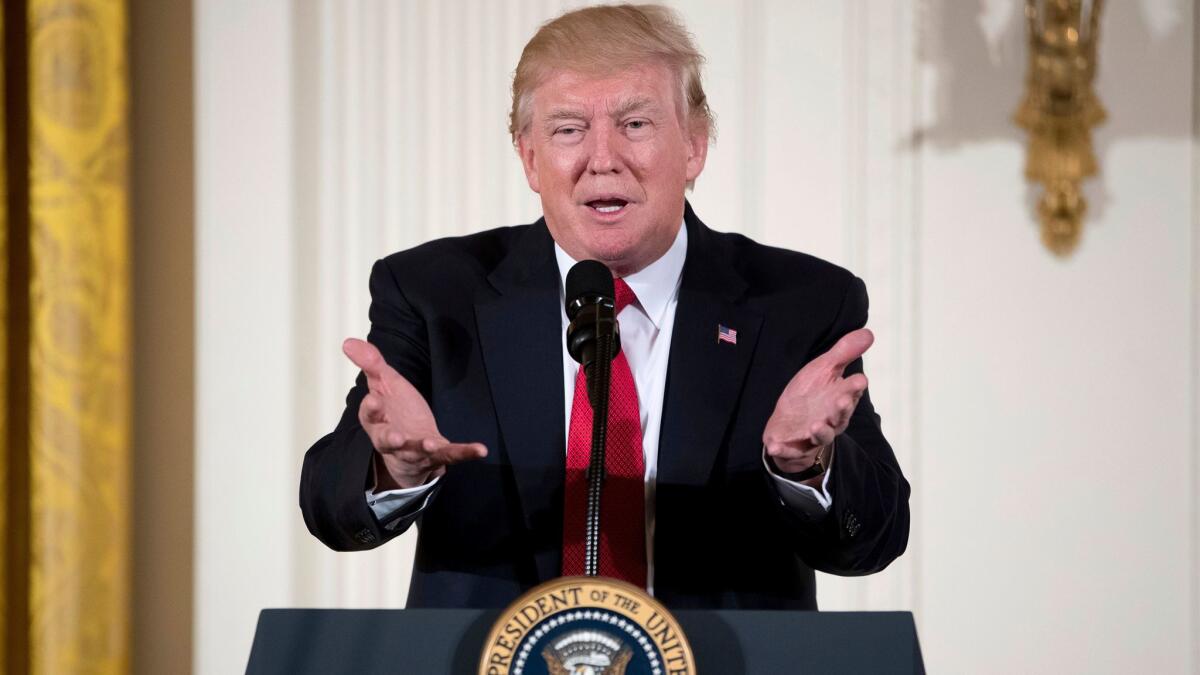Editorial: Trump faces a healthcare time bomb of the GOP’s own creation

- Share via
Republicans often suggest that Obamacare is “collapsing” without ever acknowledging the role they’ve played in undermining the law and the state insurance exchanges it created. They have an opportunity now to do even more damage to those exchanges — and to their constituents — by reneging on Obamacare’s commitment to help low-income Americans afford care.
Congressional Republicans set up this situation by trying to evade an obligation Congress created in the 2010 law (also known as the Affordable Care Act). The law makes low-income Americans who are not covered by an employer’s group plan eligible both for tax credits to lower their premiums and for subsidies to reduce their out-of-pocket costs. Without that assistance, poor families may not be able to afford to see a doctor even if they have insurance.
The ACA requires insurers who sell on the exchanges to provide the “cost-sharing” subsidies to eligible policyholders. It also requires insurers to be reimbursed by the federal Treasury, but Congress failed to appropriate money for that purpose. When the Obama administration paid the insurers anyway as required by law, the House of Representatives sued to block the payments, arguing that the administration had usurped Congress’ power of the purse. The House won in District Court, but the ruling was put on hold pending an appeal.
Trump could end the subsidies instantly by abandoning that appeal and cutting off the payments; his administration has not committed one way or the other. And if Trump cuts them off, there seems little chance that congressional Republicans who’ve been trying for years to “defund Obamacare” will agree to revive them.
The stakes are enormous. The possibility of the government reneging on $7 billion or more in annual cost-sharing subsidies leaves insurers with two bad options: They can abandon the exchanges to avoid providing the subsidies, potentially leaving millions of people uninsured, or they can build the cost of the subsidies into their premiums. Doing the latter would raise premiums for everyone buying an individual policy in a state — one insurer, Molina Healthcare, estimated that 12% of its revenue last year came from these payments. It would also drive up the cost for U.S. taxpayers of the premium tax credits, which increase in size as premiums rise. In California, where roughly half of the people buying insurance through the exchange receive cost-sharing subsidies, premiums would have to go up by about $800 million.
If Republicans in Washington really do want to protect their constituents from higher premiums and reduced competition among insurers, killing the cost-sharing subsidies would be exactly the wrong thing to do. With insurers now deciding how much to charge for their policies in 2018 — or whether to offer them at all — Trump and congressional leaders need to make clear that they will, in fact, do what the law requires.
Follow the Opinion section on Twitter @latimesopinionand Facebook
More to Read
A cure for the common opinion
Get thought-provoking perspectives with our weekly newsletter.
You may occasionally receive promotional content from the Los Angeles Times.










